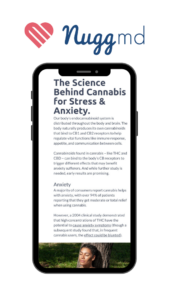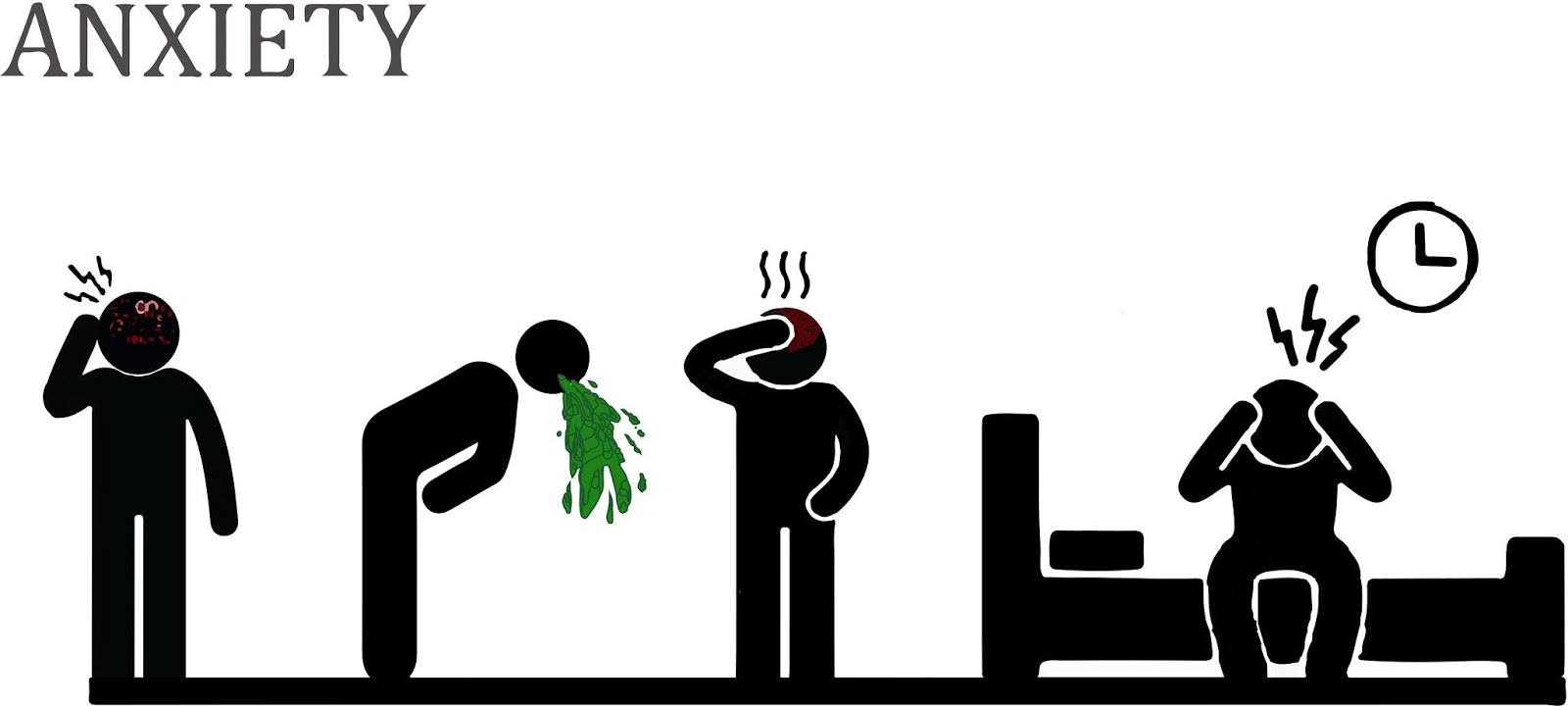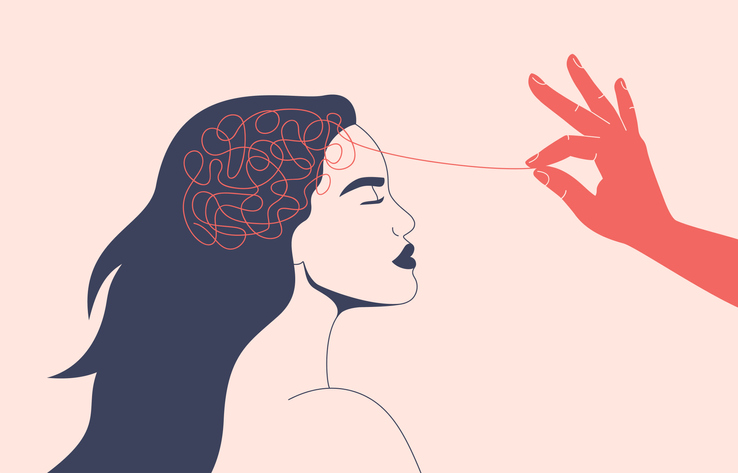In This Article
- Can Cannabis Help Treat Depression?
- What Cannabis Terpenes Help With Depression?
- Limonene
- Pinene
- Linalool
- Caryophyllene
- Benefits of Weed for Depression
- Cannabis Strains for Depression
- 1. Cinex
- 2. Jack Herer
- 3. Harlequin
- 4. Granddaddy Purple
- 5. Cannatonic
- 6. XJ-13
- 7. Blackberry Kush
- 8. GG4
- 9. Gelato
- 10. Blue Dream
- 11. Sherbert
- FAQ: Using Weed for Depression
- Which is a more effective antidepressant: THC or CBD?
- What precautions should I take when using weed for depression?
- Resources
According to the World Health Organization, depression ranks as one of the most common ailments worldwide, affecting 332 million people, or 4% of the global population.
Countless consumer anecdotes have suggested that cannabis may help with some people's depression symptoms. So what does the research really say?
Read on to learn more about the possible links between cannabis and depression, and join us as we identify 4 common terpenes and 11 of the best weed strains for depression, as decided by cannabis consumers.

Find natural, lasting relief with our comprehensive (and completely free) patient’s guide to medical cannabis for stress and anxiety.
Can Cannabis Help Treat Depression?
The clinical community remains uncertain about cannabis' efficacy on depression symptoms. Cannabis’s impact on depression has been studied for decades.1 Unfortunately, the subject is complex, and we still can’t make definitive claims.
This is due, in part, to depression’s comorbidity with various mental health conditions, ranging from anxiety to PTSD. Additionally, while THC and CBD have demonstrated antidepressant-type effects in some animal studies, the results have yet to be demonstrated in large human trials, and our understanding of how THC dosage affects depression symptom relief (or lack thereof) remains in the early stages.
Studies have found encouraging signs that cannabis may help with multiple psychiatric disorders, including depression.2 And in various studies, subjects have reported experiencing decreased depression symptoms when using cannabis as a short-term option.3,4 But concerns remain, and as of 2022, cannabis is not accepted as a treatment for depression.
What Cannabis Terpenes Help With Depression?
Terpenes are the largely unsung hero of the consumption experience. Crucial to a cannabis plant's profile, terpenes help create each cultivar's unique flavors, aromas and effects. The combination of terpenes with various cannabinoids and other plant compounds leads to the believed synergistic effect called The Entourage Effect.5
The profile varieties are nearly endless, with over 150 terpenes identified in cannabis. Of these, four common terpenes have been reported by consumers to reducing depression symptoms or related factors – like chronic pain or loss of sleep – that may play a role in the development of depression.
Limonene
Aroma: Sweet, fruity, citrus
Potential Benefits:
- Anti-inflammatory
- Antioxidant
- Decrease breast cancer cells
- Reduce certain forms of cholesterol
Also Found In:
- Oranges
- Lemons
- Grapefruit
Pinene
Aroma: Pine
Potential Benefits:
- Anti-anxiety
- Anti-inflammatory
- Antioxidant
Also Found In:
- Conifer trees
- Orange peels
- Rosemary
- Dill
- Basil
- Parsley
Note: While you can find Pinene in THC and CBD strains like Blue Dream, Grape Ape and Harlequin, you're more likely to find this terpene in nature.

Find natural, lasting relief with our comprehensive (and completely free) patient’s guide to medical cannabis for stress and anxiety.
Linalool
Aroma: Floral, sweet, and wood
Potential Benefits:
- Analgesic
- Anti-bacterial
- Antidepressant
- Anti-inflammatory
- Anxiolytic
- Sedative
Also Found In:
- Lavender
- Bergamot
- Rosemary
- Eucalyptus
- Sweet basil
Caryophyllene
Aroma: Spice, Pepper, Coffee
Potential Benefits:
- Anti-inflammatory
- Arthritis
- Nervous system disorders (i.e., Parkinson's disease)
- Atherosclerosis
- Cancer
- Osteoporosis
- Seizure disorder
- Mood disorders
Also Found In:
- Black pepper
- Hops
- Cloves
- Oregano
- Basil
- Sage
Benefits of Weed for Depression
A growing number of consumer anecdotes and clinical studies have led some to consider cannabis a viable depression option for potential symptom relief. However, further research is needed before clinicians can make any conclusive medical statements.
Still, in the eyes of many consumers, cannabis joins a list of potential options available. The growth of legal access to cannabis has led to more patients self-reporting their experiences and the benefits of using marijuana for depression relief.6 Patients have also noted a potential for helping aid depression symptoms stemming from co-occurring debilitating conditions, including chronic pain and spasticity.7
One of the more critical areas of concern that remains among clinicians and patients is the possible interaction of cannabis and antidepressants. As such, and until more clarity is achieved, healthcare providers and physicians are encouraged to extensively research the subject before using cannabis in their treatment plan.
Years of anecdotal evidence and growing research suggest that cannabis may have the potential to help alleviate depression or depression symptoms in some consumers. But until further studies are completed, consumers should practice caution before introducing cannabis to a depression treatment routine. Speak to a medical professional who has reviewed your records, and together you can discuss and determine the best course of action for your body.
Cannabis Strains for Depression

Cannabis affects each person differently. The research on cannabis and depression is still limited and ongoing, so we cannot make any firm recommendations on cannabis strains for depression.
Consider the list below for some of our picks based on previous medical cannabis patient reports, but be sure to consult a physician before using any type of cannabis for your ailments, depression or otherwise.
1. Cinex
THC: 17%
CBD: 0%
Flavor/Aroma: Sweet, Citrus
Effects: Consumers often report uplifting, creative effects that may improve focus. Watch out for adverse effects, like paranoia and dry eyes.
2. Jack Herer
THC: 18%
CBD: 0%
Flavor/Aroma: Earthy, Pine
Effects: A classic strain known for its energetic effects, Jack Herer is also associated with uplifting moods. Be on the lookout for paranoia and dry eyes and mouth.
3. Harlequin
THC: 5%
CBD: 9%
Flavor/Aroma: Spices and herbs
Effects: Known for improving focus while lifting spirits and energy levels, Harlequin may also produce adverse effects, including anxiety and headaches.
4. Granddaddy Purple
THC: 17%
CBD: 0%
Flavor/Aroma: Grape
Effects: Known for putting people to bed and producing appetites when awake, Granddaddy Purple may also leave some with dry mouth/eyes and a case of dizziness.
5. Cannatonic
THC: 4%
CBD: 9%
Flavor/Aroma: Earth, Wood
Effects: Customers say Cannatonic helps them relax and focus. On the negative side, headaches, anxiety and dry mouth have all been reported.

Find natural, lasting relief with our comprehensive (and completely free) patient’s guide to medical cannabis for stress and anxiety.
6. XJ-13
THC: 21%
CBD: 0%
Flavor/Aroma: Sweet, Citrus
Effects: XJ-13 has reportedly helped boost energy levels and sociability in many patients. Adverse effects, including paranoia, anxiety and dry eyes, may arise.
7. Blackberry Kush
THC: 17%
CBD: 0%
Flavor/Aroma: Sweet, Berry
Effects: Helping many patients with their appetites and sleep, Blackberry Kush may also dry out the eyes and mouth, with some consumers experiencing headaches.
8. GG4
THC: 21%
CBD: 0%
Flavor/Aroma: Skunk
Effects: Like Blackberry Kush and other relaxing, couch-locking strains, GG4 may also dry some consumers' eyes and mouths and/or produce headaches.
9. Gelato
THC: 15%
CBD: 0%
Flavor/Aroma: Sweet, Various
Effects: Gelato may result in common potential adverse effects, but the popular strain is better known for producing uplifting feelings that may also stimulate arousal.
10. Blue Dream
THC: 19%
CBD: 0%
Flavor/Aroma: Sweet, Berry
Effects: Another classic strain associated with uplifting, creative energy, though some consumers have reported adverse effects like paranoia, dry mouth and eyes.
11. Sherbert
THC: 18%
CBD: 0%
Flavor/Aroma: Sweet, Citrus
Effects: Sherbert is a strain linked to improved moods, namely fits of laughter and relaxation. Typical adverse effects like dryness and anxiety have been reported.
FAQ: Using Weed for Depression
Which is better for depression: indica or sativa?
Some consumers suggest that indicas are best suited for depression, citing the sedative, couch-lock effects these strains produce. But we’d urge caution in limiting yourself to a single type of strain. Indica and sativa are not meant to describe a strain's effects, but rather the structure of its flower. You're more likely to find ideal strains by analyzing each plant's profile, notably its terpene content.
Which is a more effective antidepressant: THC or CBD?
Both cannabinoids are showing promise, according to select studies. But it's too early to make definitive claims about which is the superior option when treating depression symptoms. Instead, consult a physician to better understand your condition and what may best help given your unique needs.
What precautions should I take when using weed for depression?
While it may help some consumers in the short-term and possibly longer, cannabis isn't recognized as a singular treatment for depression. Instead, medical marijuana is often seen as complementary to other mental health treatment options, including oral medications and therapy.
Speak with your doctor before using cannabis to help relieve symptoms of depression. You can discuss how cannabis may affect your other depression treatments, co-occurring conditions like anxiety, and medications if you are taking any.
Resources
- Feingold D, Weinstein A. Cannabis and Depression. Adv Exp Med Biol. 2021;1264:67-80. doi:10.1007/978-3-030-57369-0_5 ↩︎
- Sarris J, Sinclair J, Karamacoska D, Davidson M, Firth J. Medicinal cannabis for psychiatric disorders: a clinically-focused systematic review. BMC Psychiatry. 2020;20(1):24. Published 2020 Jan 16. doi:10.1186/s12888-019-2409-8 ↩︎
- Li X, Diviant JP, Stith SS, et al. The Effectiveness of Cannabis Flower for Immediate Relief from Symptoms of Depression. Yale J Biol Med. 2020;93(2):251-264. Published 2020 Jun 29. ↩︎
- Bonn-Miller MO, Sisley S, Riggs P, et al. The short-term impact of 3 smoked cannabis preparations versus placebo on PTSD symptoms: A randomized cross-over clinical trial. PLoS One. 2021;16(3):e0246990. Published 2021 Mar 17. doi:10.1371/journal.pone.0246990 ↩︎
- Ferber SG, Namdar D, Hen-Shoval D, et al. The "Entourage Effect": Terpenes Coupled with Cannabinoids for the Treatment of Mood Disorders and Anxiety Disorders. Curr Neuropharmacol. 2020;18(2):87-96. doi:10.2174/1570159X17666190903103923 ↩︎
- Martin EL, Strickland JC, Schlienz NJ, et al. Antidepressant and Anxiolytic Effects of Medicinal Cannabis Use in an Observational Trial. Frontiers in Psychiatry. 2021;12. doi:https://doi.org/10.3389/fpsyt.2021.729800 ↩︎
- Haddad F, Dokmak G, Karaman R. The Efficacy of Cannabis on Multiple Sclerosis-Related Symptoms. Life. 2022; 12(5):682. https://doi.org/10.3390/life12050682 ↩︎
The information in this article and any included images or charts are for educational purposes only. This information is neither a substitute for, nor does it replace, professional legal advice or medical advice, diagnosis, or treatment. If you have any concerns or questions about laws, regulations, or your health, you should always consult with an attorney, physician or other licensed professional.




